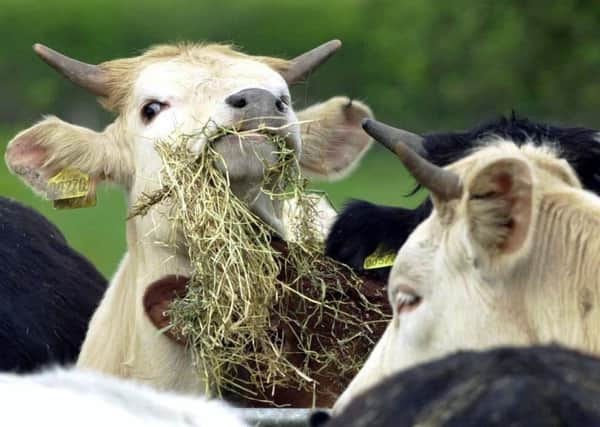Major farming study to measure true environmental contribution of livestock
This article contains affiliate links. We may earn a small commission on items purchased through this article, but that does not affect our editorial judgement.


A new industry project, bankrolled by a £2m levy fund, aims to accurately quantify the impact that the nation’s largely grass-fed and low-intensity livestock farms have on the natural world.
Greenhouse gas emissions, water use and animal welfare in the production of beef and lamb on farms will all be scrutinised to inform “a well-evidenced case” that can convince an increasingly environmentally-aware public that red meat can be a sustainable choice on supermarket shelves.
Advertisement
Hide AdAdvertisement
Hide AdAgriculture’s environmental impact was highlighted in a recet report by the UK Committee on Climate Change which recommended that Britain’s livestock numbers are reduced cut greenhouse gas emissions.
Britain’s three meat levy boards - the Agriculture and Horticulture Development Board (AHDB), Meat Promotion Wales and Quality Meat Scotland - believe that these reports, and the Government’s Agricultural Bill which advocates the delivery of public goods on farms, strengthen the need for the livestock industry to measure, manage and monitor red meat’s environmental credentials.
In order to help the sector do so, the levy boards have appointed national research consultants ADAS, which has two bases in Yorkshire, one in Leeds and another near Malton, to produce recommendations for how a “sustainability framework” for British livestock production might better operate.
Researchers will analyse how other countries, such as Ireland and Australia, monitor the environmental performance of their food supply chains to inform their recommendations.
Advertisement
Hide AdAdvertisement
Hide AdAccording to the levy boards, this body of work is the first step towards giving beef and lamb farmers, processors and retailers the information they need to actively promote red meat’s environmental credentials.
Sarah Baker, strategic insight manager at AHDB, said: “To date, discussion has focused on the potential negative impacts of livestock on the wider environment but we want to highlight the positives of livestock production to the environment and landscape, alongside social and economic benefits.
“This project is a critical first step towards the eventual development of a sustainability framework, so we can accurately measure the current and future impacts of livestock production in Great Britain.”
John Richards, industry development and relations manager at Meat Promotion Wales, added: “Our largely grass-fed and low-intensity livestock systems have a positive story to tell in terms of their environmental credentials.
Advertisement
Hide AdAdvertisement
Hide Ad“Understandably, the modern consumer demands food which impacts as little as possible on emissions and climate change, so this project will enable us to measure this accurately and have a well-evidenced case.”
The new research project is backed by £29,000 from the red meat levy boards, an investment which comes from a £2m fund that they have ring-fenced for collaborative projects.
ADAS has been asked to report back on its findings early next year.
LAND REFORM RECOMMENDATIONS QUESTIONED
Major land reforms have been recommended to address the UK’s climate change challenge, including reducing livestock numbers across Britain.
Advertisement
Hide AdAdvertisement
Hide AdAccording to the Government’s advisory Committee on Climate Change (CCC), there should be a reduction in grazing by between 26 per cent and 36 per cent, up to 1.5 million hectares of new woodland should be planted to store carbon by 2050 and a 1.2 million hectares should be used to grow bioenergy crops.
But the recommendations have been criticised by the National Sheep Association, among other farming industry groups. The NSA said the CCC had refused to accept wider and more natural aspects of the carbon cycle.
Phil Stocker, the NSA’s chief executive, said: “Putting sheep back into arable rotations results in a natural regeneration of soil quality and fertility – something that is sorely needed. It is also true that we could do more with diverse ley mixtures that support invertebrates and pollinators... sheep can gain important minerals and trace elements from doing so.”
